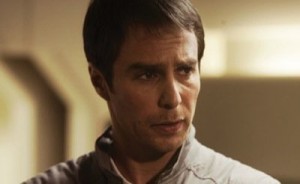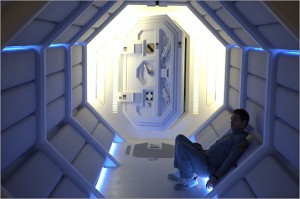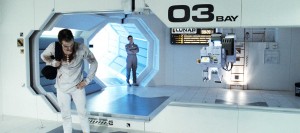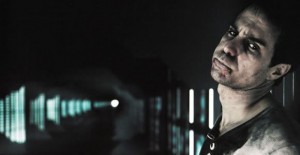Moon
 A sterile home is just plain creepy. It suggests something unlived in, frozen in time, free from human connection. David Cronenberg (Dead Ringers, The Fly, Scanners) knows this, which is why he’s always setting sections of his movies in hospitals, the most antiseptic place possible.
A sterile home is just plain creepy. It suggests something unlived in, frozen in time, free from human connection. David Cronenberg (Dead Ringers, The Fly, Scanners) knows this, which is why he’s always setting sections of his movies in hospitals, the most antiseptic place possible.
The body that had previously inhabited the room is gone. The room is waiting for the next victim, like a bed and breakfast of death.
Directors who make science fiction films understand this concept as well; hence the clean, blank, whiteness of everything from spacesuits to spaceships to walls to kitchens. Stanley Kubrick’s 2001: A Space Odyssey plays like a paean to how unsettling sterility can be, from Hal’s perfect and boring cadence to the way the astronauts do exercise without causing a smudge or footprint.
In Duncan Jones’ Moon, Sam Rockwell’s character, Sam Bell, seems aware of this cleanliness concept as he angrily exclaims about his complete knowledge of his ship and how he “knows every speck of dirt between those cushions.” Its Sam’s way of reassuring himself that he is a human being who can make a mess and not clean it up, and that he’s completely aware of his surroundings. Of course, the fact that he’s saying it to his clone undermines his point a little bit.
 Sam’s been on the moon harvesting an energy source that’s being redirected toward Earth for almost three years now and, in a way, he relishes the boredom, the repetition and the rote conversations he has with the ship’s computer, Gerty (voiced by Kevin Spacey in a wonderfully flat way that is either menacing or reassuring, depending on how you read the lack of inflection). Sam’s nearing the end of his contract with an enormous corporation, which is a bad sign in a sci-fi film, as evidenced by the employees of the Nostromo in Alien.
Sam’s been on the moon harvesting an energy source that’s being redirected toward Earth for almost three years now and, in a way, he relishes the boredom, the repetition and the rote conversations he has with the ship’s computer, Gerty (voiced by Kevin Spacey in a wonderfully flat way that is either menacing or reassuring, depending on how you read the lack of inflection). Sam’s nearing the end of his contract with an enormous corporation, which is a bad sign in a sci-fi film, as evidenced by the employees of the Nostromo in Alien.
Moon is close to Solaris in concept, but Alien in style — especially the slow, menacing build-up (and terrific practical effects and miniature work, though sometimes the space rovers do look a little too much like Tonka Trucks). The slow build leads to plot turns that may not be revolutionary, but are unnerving, especially if you sense them coming. Like Alien, Moon is anxious, using its thumping score (by Clint Mansell, whose music was similarly effective in Requiem For a Dream) to tap at your nerves. But it taps bit by bit, instead of using the noisier approach of the ineffective and shallow Event Horizon.
 And unlike Event Horizon, Rockwell is alone on the ship (and planet). So the only death he can worry about is his own. This means that Rockwell doesn’t get a break and is on-screen in every scene, often having to interact with himself. Jeremy Irons, who, in Dead Ringers, created the most convincing divide between the twin characters he plays, two completely different personalities, had scenes with Genvieve Bujold to fall back on. But Rockwell is on his own. He gives the audience the same man at different stages in his life with different realizations of the amount of betrayal he may be the victim of, and it is totally convincing.
And unlike Event Horizon, Rockwell is alone on the ship (and planet). So the only death he can worry about is his own. This means that Rockwell doesn’t get a break and is on-screen in every scene, often having to interact with himself. Jeremy Irons, who, in Dead Ringers, created the most convincing divide between the twin characters he plays, two completely different personalities, had scenes with Genvieve Bujold to fall back on. But Rockwell is on his own. He gives the audience the same man at different stages in his life with different realizations of the amount of betrayal he may be the victim of, and it is totally convincing.
 What’s so refreshing about Moon is the amount of information that Jones and screenwriter Nathan Parker assume we can pick up without them pointing it out or overexplaining (they must have learned from David Mamet’s Spartan). This suggests that they believe we are smart; not just waiting to be led from one plot point to another. Rockwell has the perfect face for what happens to him, he doesn’t have lot of mobility or slack in his skin, and so he provides us with Cro-Magnon man expressions as he tries to comprehend his situation. This is perfectly countered with Gerty’s face, which is a simple “have a nice day” smiley face, changing to a frown or tears when Gerty thinks that’s what Sam would expect as a human reaction.
What’s so refreshing about Moon is the amount of information that Jones and screenwriter Nathan Parker assume we can pick up without them pointing it out or overexplaining (they must have learned from David Mamet’s Spartan). This suggests that they believe we are smart; not just waiting to be led from one plot point to another. Rockwell has the perfect face for what happens to him, he doesn’t have lot of mobility or slack in his skin, and so he provides us with Cro-Magnon man expressions as he tries to comprehend his situation. This is perfectly countered with Gerty’s face, which is a simple “have a nice day” smiley face, changing to a frown or tears when Gerty thinks that’s what Sam would expect as a human reaction.
Gerty’s avoidance of Sam’s questions about what’s really going on sets up terrific scenes where Sam Bell reminisces about his life on Earth — with his own clone. Sam’s attempt to reconcile and accept his situation is both inspiring and foolish; it’s no wonder the stress builds up so much. As he says early on, with obvious foreshadowing, “my tummy’s a little tender.”
I may not be a clone. But watching Moon, I’d have to agree.



